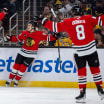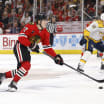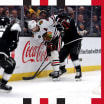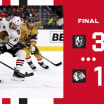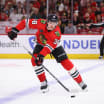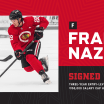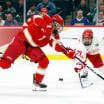Windsor, Ontario -- Alex DeBrincat's roots are showing. The dye job that the Erie Otters subjected themselves to at the start of their Ontario Hockey League playoff run has started to fade, now clashing dully with the cadmium yellow team polo he's wearing.
But that's a good thing. This is exactly where he wants to be -- rocking a fairly impressive beard, still playing hockey at the end of May, and one win away from assuring a spot in the Memorial Cup final. The Otters remained undefeated with a historic 12-5 win over Saint John on Monday evening, setting up a showdown with the hometown Spitfires (the other team without a loss in the tournament) on Wednesday.
In each of the last two seasons, the Otters lost out to the team that eventually won the Memorial Cup (Oshawa in 2015, London in 2016). Now they hope to end the season on top.
"It's tough to get to the finals and having the feeling of getting there and not winning," DeBrincat said. "A lot of guys in the room knew what that felt like, and it's obviously great to win the [OHL] championship, but that was just a stepping stone. The real prize we want is the Memorial Cup."
DeBrincat hopes to end his junior career with Memorial Cup triumph
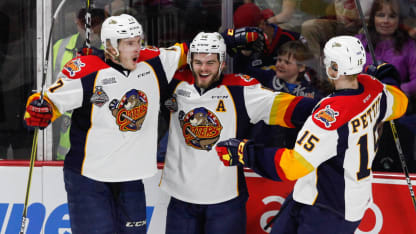
While Sunday's contest wasn't much of one after a certain point, suspense was replaced by another type of excitement -- that of watching an elite group of prospects, DeBrincat included, transcend the competition.
The Blackhawks' second-round pick in 2016 picked up his first of four points midway through the first period on a sequence that demonstrated his playmaking ability, an underrated part of his game only due to his goal-scoring prowess. Picking up a loose puck in the neutral zone, DeBrincat sidestepped two colliding Saint John players at the blue line. In the span of two seconds, he went to his backhand to protect the puck from a sprawling defender, pivoted his body back around to set up the two-on-one, then immediately found center Dylan Strome for a one-timer.
It was the kind of play that draws rave reviews from average viewers and experienced hockey minds alike.
"You see all those plays and passes that are so quick, but what impresses me about that is the fact that he knows what he's doing before the puck comes all the time, so he's way ahead of the game," Development Coach Derek Plante said. "So many guys, they get the puck and then they look for what they're going to do. The reason Alex can move the puck so quick is because he thinks about what's happening ahead of the game."
It's his preternatural hockey sense, and not simply the fact that he made 65 goals in 63 regular-season games look easy, that excites the Blackhawks the most about the 19-year-old.
"His size isn't a factor, he always puts himself in the right spots, and his smarts are just so noticeable," Director of Player Development Mark Eaton said. "That's not always the case with players, but for him, you can almost see his brain working. You can see how he thinks the game."
Speaking on behalf of the defensemen who are tasked with stopping DeBrincat, Eaton added: "If a guy's always a step or two ahead of you, that makes life tough."
DeBrincat says his instincts on the ice come from years and years of playing above his age group and, by association, his height and weight bracket.
"I had to find the areas of the ice where I wasn't going to get crushed, or find a way to get to the net," he explained. "For me it came naturally."
Although he's always expressed confidence in his abilities, DeBrincat never envisioned the success he'd have three years after entering the OHL as an unheralded free agent signing.
"My first year, I was just trying to make the lineup every night," he said. "It turned out a lot better than that. I had a lot of opportunity when I came in here, ran with the chances I got and ended up playing with some elite players."
Surely DeBrincat has earned the "elite" tag himself. He has certainly answered most of the questions lobbed at him throughout his wildly successful, yet still nascent, career. Whether he was too small to excel at the OHL level. Whether he could keep up with the likes of Connor McDavid and Strome -- and then, later, whether he could keep up without them.
Past challenges, no problem. But what about future challenges, like the one awaiting him this summer as he prepares to turn pro?
"I just think I need to know my game and be confident in my game," he said, after taking a few extra moments to consider the question. "It's not always going to go your way, so just battling each and every night, trying to make the team would be the toughest thing for me. It's not going to come easy at all."
Nothing has come easy for DeBrincat, no matter how simple he makes it look on the ice sometimes. He mentions that he's still working on the defensive part of his game and his conditioning, and he hopes the effort he's put in this season will prove to the Blackhawks that he's ready for the NHL sooner rather than later.
"I think I've done a lot of things this year to show them that I'm ready and I'm trying to be ready," DeBrincat said. "A thing I got sent back to juniors with [at the end of training camp] was to learn how to be a pro on and off the ice. That's something I've really tried to take pride in this year, and I did the best I could."
His best effort netted him 65 goals -- a single-season club record -- as well as the Red Tilson Trophy as the OHL's most outstanding player. The individual accolades are nice, but DeBrincat wants to add one more line to his already impressive résumé.
"Not many people get to say that they've won the Memorial Cup, and that's something I want to end my career [here] on."

